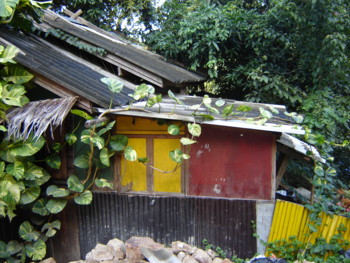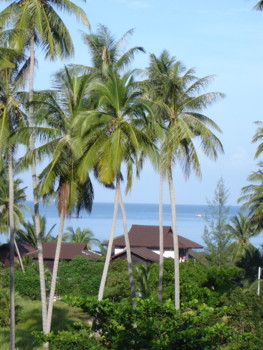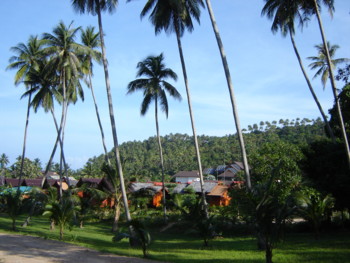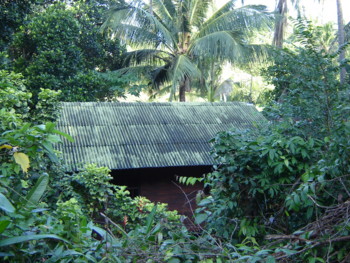25.01.08
More Crude and Unapologetic Cultural Generalizations...
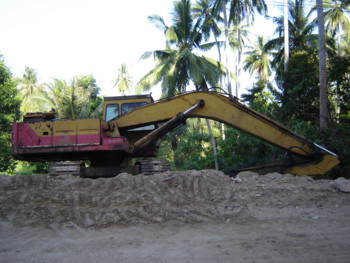 Coming back into Vancouver and flying over to Victoria, I notice patches of clearcut forest and realize that Canadians, like Americans, have built a country on killing -- killing of nature or of other cultures, whatever stands in the way of comfort and material progress. There is a similarity of intent - conquest for survival, then more - but a difference in style. In Canada the land stretches seemingly without limit beyond the horizon: unkempt and unkept nature, cold dark forests and mountains. As if humbled by this perspective of the vast unending wilderness, in contrast to their diminutive efforts, Canadians go about their killing with quiet and practical efficiency. Canadians are also rather reserved in the socio-political sphere, content in their perpetual status as colony to the greater power (first England, then America). Americans, on the other hand, have been emboldened by their swift conquest of a continent and more lately, a global political economy. Relishing their success with a reckless pursuit of materialism, some Americans take a shameless (one might say, crude and unapologetic) pride in their accomplishments and status as dominators.
Coming back into Vancouver and flying over to Victoria, I notice patches of clearcut forest and realize that Canadians, like Americans, have built a country on killing -- killing of nature or of other cultures, whatever stands in the way of comfort and material progress. There is a similarity of intent - conquest for survival, then more - but a difference in style. In Canada the land stretches seemingly without limit beyond the horizon: unkempt and unkept nature, cold dark forests and mountains. As if humbled by this perspective of the vast unending wilderness, in contrast to their diminutive efforts, Canadians go about their killing with quiet and practical efficiency. Canadians are also rather reserved in the socio-political sphere, content in their perpetual status as colony to the greater power (first England, then America). Americans, on the other hand, have been emboldened by their swift conquest of a continent and more lately, a global political economy. Relishing their success with a reckless pursuit of materialism, some Americans take a shameless (one might say, crude and unapologetic) pride in their accomplishments and status as dominators.
01.02.08
Connectivity Issues
“If we have not found heaven within, it is a certainty we will not find it without.”--Henry Miller
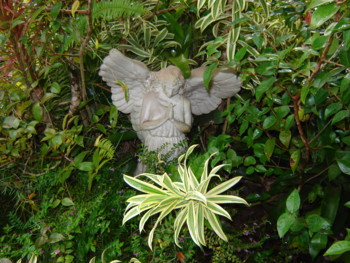 It’s all a melange of dreams and expectations, glitches and disappointments. Did I really expect paradise to be graced with seamless connectivity? How to reconcile the placid warm waters of this Thai island beach with any worldly ambition of efficiency or success? In wanting my tropical cake and eating it too in my ultracivilized way, something gets lost in translation.
It’s all a melange of dreams and expectations, glitches and disappointments. Did I really expect paradise to be graced with seamless connectivity? How to reconcile the placid warm waters of this Thai island beach with any worldly ambition of efficiency or success? In wanting my tropical cake and eating it too in my ultracivilized way, something gets lost in translation.
For details, there are certainly the obvious successes and failures, highs and lows of my connection to this place and its people (whether foreign or local or somewhere in between). Fresh from the exhilarating freedom of receiving email to my Blackberry in the jungle in Maui, I find that I cannot connect with it to any local data service provider in Thailand; and in attempting to upgrade its software for a backdoor solution I found on the Internet, it crashed and has not yet recovered. Of course the support line back in Canada is open for business only when the overseas call centers here are closed; and the international phone card I bought to use in the phone booths is useless in the absence of any local phone booth. On my way down the sweltering road to the useless phone booth, the improvised container of sunscreen (which I’d filled at home for this trip after having my primary tube confiscated at the airport in Vancouver) exploded in my hands.
On the positive side, I’ve been enjoying the frequent company of a good new Canadian friend I met at a river pier in Bangkok, in transit to the same island yoga course where I was bound and staying at the same guest house in the city. And I did make some fortuitous drumming connections in Bangkok through my friend Michael Pluznick, who arranged a rooftop group session atop a 44-story highrise with a panoramic view of the city, showing us parts for five West African rhythms and engaging in wondrous solos. The group included our host, a longtime expat; a Sri Lankan kit player; and another kit player about to fly home to play with Jefferson Starship. Afterwards we went to the lavish buffet at the Sheraton before retiring upstairs to catch the last half-hour of a great subtle jazz group featuring guitar, piano, drums and standup bass. The drummer had jammed with the others the night before, and for the last song of the set the Starship drummer sat in. They created a great sense of space in the consonant and sparse improvisation from each quarter: a revelation after my jam with friends at home several days before, when I’d found it hard to restrain my exuberance in free jamming after many months of structured playing with set rhythms.
Earlier that afternoon in my quest for a local phone service SIM card, I had glimpsed some royalty whizzing by enroute to shopping at the chic Siam Paragon shopping megalith, their cute red sports car escorted by numerous police and military personnel, with both vehicle and pedestrian traffic held up for blocks for their passing.
Next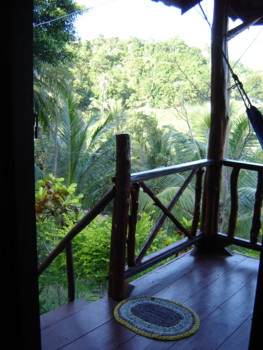 day I took a break from my friend Anna and the King of Siam to seek out an isolated corner of a large city park where I could play my drum and flute freely without disturbing too many nappers. Day three was devoted to finding an alternate bus ticket to leave the city that night, after the initial disappointment of hearing that the bus associated with the guest house was already full; then spending the afternoon doing an editing job which, by complete coincidence, turned out to be a paper on Thai linguistics by an anonymous client from Bangkok. After a long night’s bus ride and morning ferry trip to Koh Phangan, I finally got settled at Rose’s Bungalows where I’d stayed with Nora and Cleo two years ago on my first trip to Thailand. I could finally drop my load, practice drumming again while an excavator roared in the near distance, shower, then sink into the deep sleep of home -- at least, a home away from home.
day I took a break from my friend Anna and the King of Siam to seek out an isolated corner of a large city park where I could play my drum and flute freely without disturbing too many nappers. Day three was devoted to finding an alternate bus ticket to leave the city that night, after the initial disappointment of hearing that the bus associated with the guest house was already full; then spending the afternoon doing an editing job which, by complete coincidence, turned out to be a paper on Thai linguistics by an anonymous client from Bangkok. After a long night’s bus ride and morning ferry trip to Koh Phangan, I finally got settled at Rose’s Bungalows where I’d stayed with Nora and Cleo two years ago on my first trip to Thailand. I could finally drop my load, practice drumming again while an excavator roared in the near distance, shower, then sink into the deep sleep of home -- at least, a home away from home.
Humor is in inverse proportion to ambition.--Norman Lewis
It didn’t help my contented mood of settlement to discover, while unpacking, that my stash of $165 in cash had gone missing, in some mysterious fashion, somewhere between Hong Kong - or was it Vancouver? - and Rose’s bungalow. But I didn’t allow myself to dwell long on this misfortune or miscalculation, beyond trying to recall just which pack pockets were left unlocked when. Is this evolution, when previous causes of anger and bitterness now trigger just mild disgust and resignation? I am not, after all, merely playing “The Game of Life” to win by maximizing gains and minimizing losses; or if I am, I can at least intuit that there is more to the game’s accounting than a balance sheet of time and money. Nothing that can’t be cured by a good Thai massage on the beach -- especially at $8 per hour.
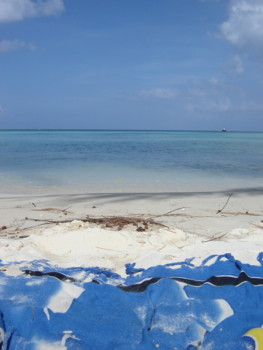 Lately my days have been devoted to the timeless pursuits of sunbathing, swimming, snorkeling, and hiking the back roads; sharing good food and conversation with Anna; and my persistent quest to resolve the malfunctioning Blackberry. It’s not so much that I need the phone while I am here -- though it would make it easier to arrange next week’s rendezvous with Michael on Koh Samui, and assist my other friend Anna from last year’s India trip in finding her way here -- it’s more a matter of principle, of putting into working order what I had hoped for following November’s tortuous decision to spring for a cell phone in the first place. Meanwhile I cannot help but harbor resentment for the sales rep who convinced me to take the Blackberry over the Nokia, touting its supposedly superior performance and eminent suitability for travel in Thailand. I followed his advice in buying an “unlocking” code so that I could avoid paying exorbitant roaming charges while here ... only to find that the local providers don’t support Blackberry unless you are a resident with a work permit.
Lately my days have been devoted to the timeless pursuits of sunbathing, swimming, snorkeling, and hiking the back roads; sharing good food and conversation with Anna; and my persistent quest to resolve the malfunctioning Blackberry. It’s not so much that I need the phone while I am here -- though it would make it easier to arrange next week’s rendezvous with Michael on Koh Samui, and assist my other friend Anna from last year’s India trip in finding her way here -- it’s more a matter of principle, of putting into working order what I had hoped for following November’s tortuous decision to spring for a cell phone in the first place. Meanwhile I cannot help but harbor resentment for the sales rep who convinced me to take the Blackberry over the Nokia, touting its supposedly superior performance and eminent suitability for travel in Thailand. I followed his advice in buying an “unlocking” code so that I could avoid paying exorbitant roaming charges while here ... only to find that the local providers don’t support Blackberry unless you are a resident with a work permit.
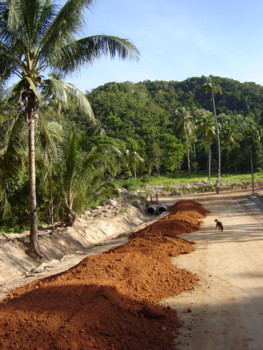 So meanwhile, I’m left waiting for a reply from Rogers email support (advertised as 24-hour response time, but currently revised to “5 business days”); finding purpose in a morning’s stifling walk to the nearest pay phone, though it didn’t work and Internet service along the way was intermittently shut down with local electricity; recalling tales of fellow travelers such as the Scottish-Malaysian doctor who swam with penguins in Antarctica, or witnessed mass deaths in Nigeria when cholera and yellow fever epidemics were not acknowledged as possible (because they were considered “unclean”) by local sultans who therefore allowed them to proceed unchecked; eating at a beachfront restaurant, anything different than the “same-same” Thai fare everywhere: baked macaroni with cheese, chicken and ham (and a zest of Thai spice). At least I handled three small editing jobs today when the electricity happened to be on, so the thread of professional identity can continue thinly along the edge of this otherwise all-too-languid shore.
So meanwhile, I’m left waiting for a reply from Rogers email support (advertised as 24-hour response time, but currently revised to “5 business days”); finding purpose in a morning’s stifling walk to the nearest pay phone, though it didn’t work and Internet service along the way was intermittently shut down with local electricity; recalling tales of fellow travelers such as the Scottish-Malaysian doctor who swam with penguins in Antarctica, or witnessed mass deaths in Nigeria when cholera and yellow fever epidemics were not acknowledged as possible (because they were considered “unclean”) by local sultans who therefore allowed them to proceed unchecked; eating at a beachfront restaurant, anything different than the “same-same” Thai fare everywhere: baked macaroni with cheese, chicken and ham (and a zest of Thai spice). At least I handled three small editing jobs today when the electricity happened to be on, so the thread of professional identity can continue thinly along the edge of this otherwise all-too-languid shore.
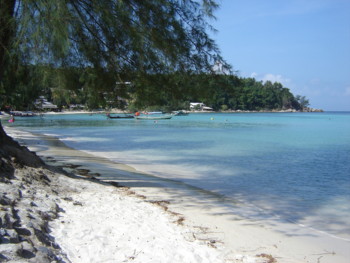
Paradise is best known when it is lost.--Pico Ayer, "An Englishman in Paradise"
I know I am no philosopher; but Pico Iyer’s fine phrase, “Paradise is best known when it is lost” provokes some considered response in this land of limbo between eleusia and ennui. The quantum approach, for instance, leads us to recognize that the losing, in the form of separation, comes in the very act of knowing. That is, at least, when “knowing” is of the rational, analytical type, in which the ego-mind is engaged in separating all the things in this world, especially itself in its fearful defense of individualistic survival.
There is another kind of knowing, however, that is inclusive instead of divisive, and that gives a more hopeful vision than Iyer’s archly civilized cynicism. In this knowing of a higher awareness than that of the small-self ego, the individual identity is dissolved to make way for a greater appreciation for the whole -- whether that is the whole of one’s immediate surroundings or the whole of universal existence. Such knowing seeks not to describe and delineate, but rather to embrace and expand; and in the process it enhances rather than demeans our conception of “paradise.” In this higher-order sense, we might truthfully say, “Paradise is found when it is best known.”
02.02.08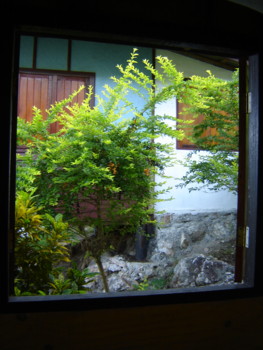 Today saw more of the same . . . though with new twists and wrinkles. On the technical end of things I was happy to discover a WiFi outlet for affordable Internet access; but the connection was slow, and in my quest to download the proper software to repair the ailing Blackberry, I gave up the wireless connection in favor of a faster cable hookup up the street at Jay Jay’s travel. Unfortunately, though that connection was indeed faster, my promising download still aborted halfway along due to the vagaries of the satellite connection this island depends on.
Today saw more of the same . . . though with new twists and wrinkles. On the technical end of things I was happy to discover a WiFi outlet for affordable Internet access; but the connection was slow, and in my quest to download the proper software to repair the ailing Blackberry, I gave up the wireless connection in favor of a faster cable hookup up the street at Jay Jay’s travel. Unfortunately, though that connection was indeed faster, my promising download still aborted halfway along due to the vagaries of the satellite connection this island depends on.
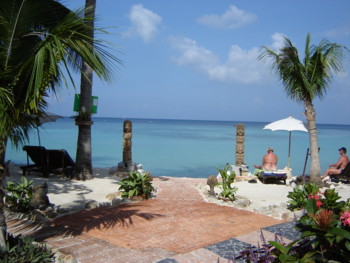 My evidently misguided attempts to be a cyber-cowboy in Thailand were tempered by long and peaceful sits in the sparsely populated beachfront restaurants. With no contact with either Anna today, I was left to my own devices: both computerized and meditative. It occurred to me while sitting in that public space overlooking the crystal water that I was indeed at home here . . . reflecting on the comparative scene I once enjoyed outside my house in Argenta looking at the distant view of Kootenay Lake. The key difference here, apart from the obvious one of climate, is that here “my place” is not my own in the usual sense of private property; and yet, my new sense here today is that “being at home” in a place is more simply a subjective attitude, a way of being at peace with one’s surroundings.
My evidently misguided attempts to be a cyber-cowboy in Thailand were tempered by long and peaceful sits in the sparsely populated beachfront restaurants. With no contact with either Anna today, I was left to my own devices: both computerized and meditative. It occurred to me while sitting in that public space overlooking the crystal water that I was indeed at home here . . . reflecting on the comparative scene I once enjoyed outside my house in Argenta looking at the distant view of Kootenay Lake. The key difference here, apart from the obvious one of climate, is that here “my place” is not my own in the usual sense of private property; and yet, my new sense here today is that “being at home” in a place is more simply a subjective attitude, a way of being at peace with one’s surroundings.
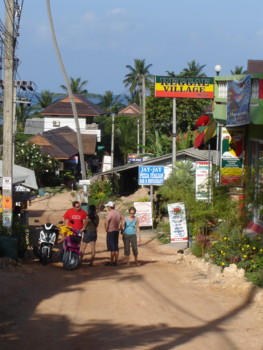 Perhaps diverted by my ongoing quest to iron out the glitch in my phone-computer, today I felt free of any desires to improve upon, complain about, or otherwise fix my physical surroundings. I no longer felt the need to compare Thailand to Hawaii or Canada, whether favorably or not; or maybe it was that I felt well enough favored and settled here, accepting finally my place here for better or worse, for the duration of my stay this winter at least, that I could finally be present to enjoy what it had to offer. Or, maybe, like the bliss I felt most palpably at the exact midpoint of my three-week visit to Maui, my contentment in this temporary home today came also at the likely midpoint of my six-day period of residence here before moving on to Koh Samui and Wat Kow Tham. Still another realization raises its unromantic head: that I feel most at home here on a day when I spend half of it on the computer.
Perhaps diverted by my ongoing quest to iron out the glitch in my phone-computer, today I felt free of any desires to improve upon, complain about, or otherwise fix my physical surroundings. I no longer felt the need to compare Thailand to Hawaii or Canada, whether favorably or not; or maybe it was that I felt well enough favored and settled here, accepting finally my place here for better or worse, for the duration of my stay this winter at least, that I could finally be present to enjoy what it had to offer. Or, maybe, like the bliss I felt most palpably at the exact midpoint of my three-week visit to Maui, my contentment in this temporary home today came also at the likely midpoint of my six-day period of residence here before moving on to Koh Samui and Wat Kow Tham. Still another realization raises its unromantic head: that I feel most at home here on a day when I spend half of it on the computer.
 03.02.08I succeed finally in downloading the required software for the Blackberry ... but the installation process still fails, and so finally I give up ... at least this phase of trials. Later, walking home airy light from the hyperventilated state of bliss after kirtan with thirty voices in the sound chamber at the yoga center, I hold somehow this dual vision of who I am, as man walking down the earth road under stars: the spirit being lifted to higher communal consciousness; and the toolmaking human still driven to iron out the glitches in his latest technology. Three Sundays ago I was similarly lifted to heights of ecstasy in a Haiku, Maui singing circle ... and balanced that unsustainable bliss with a twelve-hour grounding of sleep.
03.02.08I succeed finally in downloading the required software for the Blackberry ... but the installation process still fails, and so finally I give up ... at least this phase of trials. Later, walking home airy light from the hyperventilated state of bliss after kirtan with thirty voices in the sound chamber at the yoga center, I hold somehow this dual vision of who I am, as man walking down the earth road under stars: the spirit being lifted to higher communal consciousness; and the toolmaking human still driven to iron out the glitches in his latest technology. Three Sundays ago I was similarly lifted to heights of ecstasy in a Haiku, Maui singing circle ... and balanced that unsustainable bliss with a twelve-hour grounding of sleep.
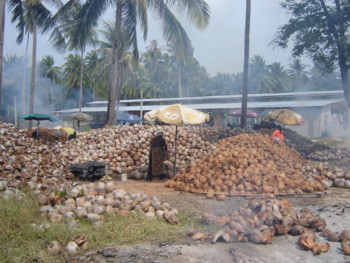 The assault to the senses is immediate as I walk from the monastery road onto the main road through Ban Tai. Taxi trucks, motorbikes, SUVs rumbling by. Signs and shops, drying fish, burning coconuts, the bustle of everyday activity ... it’s all perfectly normal, if you live there everyday; but I’ve just spent 10 days on the hill in silent seclusion with thirty other meditators and resident Thail monks. Our days have been punctuated by the slow resonant sound of the bells ringing time to awake or work or sit. The view of the island is from a high rock, where everything appears in minature, sounds and sights by distance into a peaceful blur.
The assault to the senses is immediate as I walk from the monastery road onto the main road through Ban Tai. Taxi trucks, motorbikes, SUVs rumbling by. Signs and shops, drying fish, burning coconuts, the bustle of everyday activity ... it’s all perfectly normal, if you live there everyday; but I’ve just spent 10 days on the hill in silent seclusion with thirty other meditators and resident Thail monks. Our days have been punctuated by the slow resonant sound of the bells ringing time to awake or work or sit. The view of the island is from a high rock, where everything appears in minature, sounds and sights by distance into a peaceful blur.



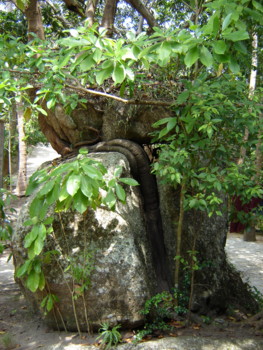
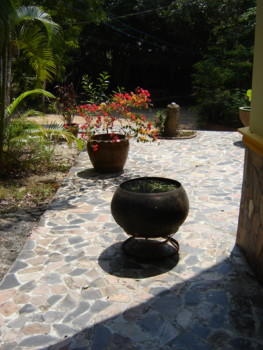

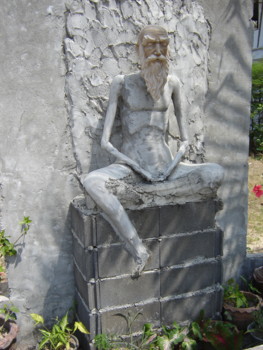
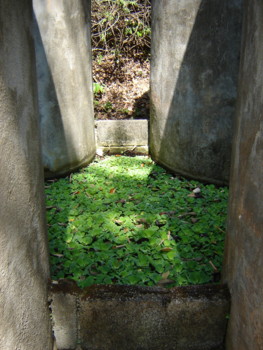
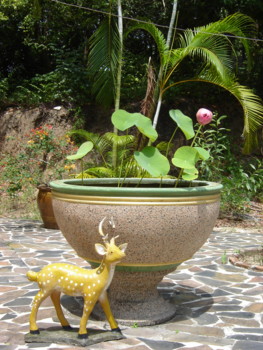
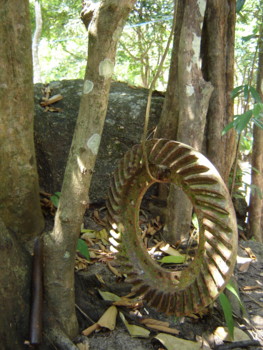

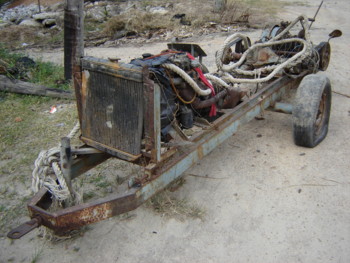
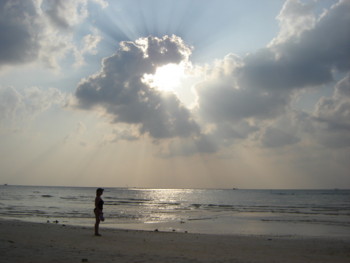
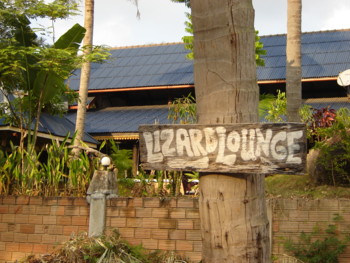
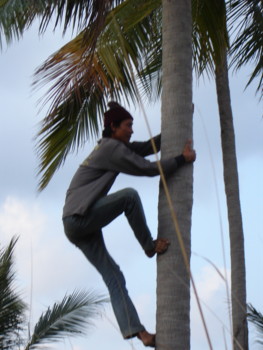
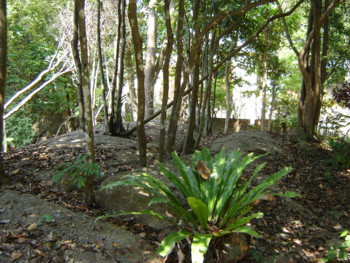
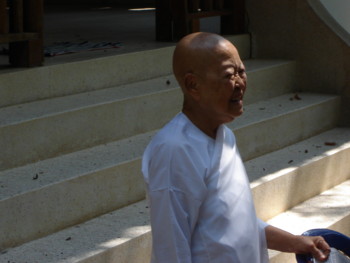

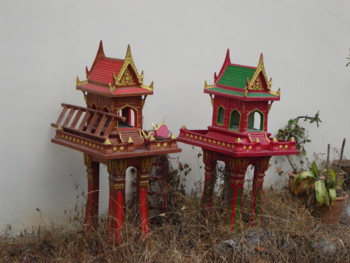
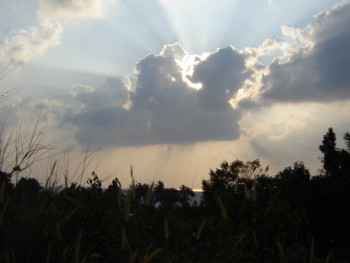
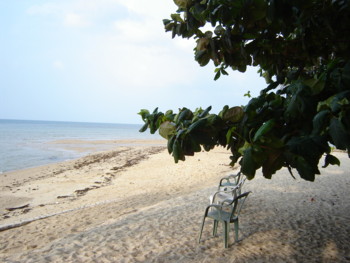
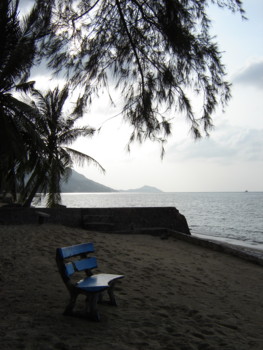


 Coming back into Vancouver and flying over to Victoria, I notice patches of clearcut forest and realize that Canadians, like Americans, have built a country on killing -- killing of nature or of other cultures, whatever stands in the way of comfort and material progress. There is a similarity of intent - conquest for survival, then more - but a difference in style. In Canada the land stretches seemingly without limit beyond the horizon: unkempt and unkept nature, cold dark forests and mountains. As if humbled by this perspective of the vast unending wilderness, in contrast to their diminutive efforts, Canadians go about their killing with quiet and practical efficiency. Canadians are also rather reserved in the socio-political sphere, content in their perpetual status as colony to the greater power (first England, then America). Americans, on the other hand, have been emboldened by their swift conquest of a continent and more lately, a global political economy. Relishing their success with a reckless pursuit of materialism, some Americans take a shameless (one might say, crude and unapologetic) pride in their accomplishments and status as dominators.
Coming back into Vancouver and flying over to Victoria, I notice patches of clearcut forest and realize that Canadians, like Americans, have built a country on killing -- killing of nature or of other cultures, whatever stands in the way of comfort and material progress. There is a similarity of intent - conquest for survival, then more - but a difference in style. In Canada the land stretches seemingly without limit beyond the horizon: unkempt and unkept nature, cold dark forests and mountains. As if humbled by this perspective of the vast unending wilderness, in contrast to their diminutive efforts, Canadians go about their killing with quiet and practical efficiency. Canadians are also rather reserved in the socio-political sphere, content in their perpetual status as colony to the greater power (first England, then America). Americans, on the other hand, have been emboldened by their swift conquest of a continent and more lately, a global political economy. Relishing their success with a reckless pursuit of materialism, some Americans take a shameless (one might say, crude and unapologetic) pride in their accomplishments and status as dominators. It’s all a melange of dreams and expectations, glitches and disappointments. Did I really expect paradise to be graced with seamless connectivity? How to reconcile the placid warm waters of this Thai island beach with any worldly ambition of efficiency or success? In wanting my tropical cake and eating it too in my ultracivilized way, something gets lost in translation.
It’s all a melange of dreams and expectations, glitches and disappointments. Did I really expect paradise to be graced with seamless connectivity? How to reconcile the placid warm waters of this Thai island beach with any worldly ambition of efficiency or success? In wanting my tropical cake and eating it too in my ultracivilized way, something gets lost in translation. day I took a break from my friend Anna and the King of Siam to seek out an isolated corner of a large city park where I could play my drum and flute freely without disturbing too many nappers. Day three was devoted to finding an alternate bus ticket to leave the city that night, after the initial disappointment of hearing that the bus associated with the guest house was already full; then spending the afternoon doing an editing job which, by complete coincidence, turned out to be a paper on Thai linguistics by an anonymous client from Bangkok. After a long night’s bus ride and morning ferry trip to Koh Phangan, I finally got settled at Rose’s Bungalows where I’d stayed with Nora and Cleo
day I took a break from my friend Anna and the King of Siam to seek out an isolated corner of a large city park where I could play my drum and flute freely without disturbing too many nappers. Day three was devoted to finding an alternate bus ticket to leave the city that night, after the initial disappointment of hearing that the bus associated with the guest house was already full; then spending the afternoon doing an editing job which, by complete coincidence, turned out to be a paper on Thai linguistics by an anonymous client from Bangkok. After a long night’s bus ride and morning ferry trip to Koh Phangan, I finally got settled at Rose’s Bungalows where I’d stayed with Nora and Cleo  Lately my days have been devoted to the timeless pursuits of sunbathing, swimming, snorkeling, and hiking the back roads; sharing good food and conversation with Anna; and my persistent quest to resolve the malfunctioning Blackberry. It’s not so much that I need the phone while I am here -- though it would make it easier to arrange next week’s rendezvous with Michael on Koh Samui, and assist my other friend Anna from last year’s India trip in finding her way here -- it’s more a matter of principle, of putting into working order what I had hoped for following November’s tortuous decision to spring for a cell phone in the first place. Meanwhile I cannot help but harbor resentment for the sales rep who convinced me to take the Blackberry over the Nokia, touting its supposedly superior performance and eminent suitability for travel in Thailand. I followed his advice in buying an “unlocking” code so that I could avoid paying exorbitant roaming charges while here ... only to find that the local providers don’t support Blackberry unless you are a resident with a work permit.
Lately my days have been devoted to the timeless pursuits of sunbathing, swimming, snorkeling, and hiking the back roads; sharing good food and conversation with Anna; and my persistent quest to resolve the malfunctioning Blackberry. It’s not so much that I need the phone while I am here -- though it would make it easier to arrange next week’s rendezvous with Michael on Koh Samui, and assist my other friend Anna from last year’s India trip in finding her way here -- it’s more a matter of principle, of putting into working order what I had hoped for following November’s tortuous decision to spring for a cell phone in the first place. Meanwhile I cannot help but harbor resentment for the sales rep who convinced me to take the Blackberry over the Nokia, touting its supposedly superior performance and eminent suitability for travel in Thailand. I followed his advice in buying an “unlocking” code so that I could avoid paying exorbitant roaming charges while here ... only to find that the local providers don’t support Blackberry unless you are a resident with a work permit.
 My evidently misguided attempts to be a cyber-cowboy in Thailand were tempered by long and peaceful sits in the sparsely populated beachfront restaurants. With no contact with either Anna today, I was left to my own devices: both computerized and meditative. It occurred to me while sitting in that public space overlooking the crystal water that I was indeed at home here . . . reflecting on the comparative scene I once enjoyed outside my house in Argenta looking at the distant view of Kootenay Lake. The key difference here, apart from the obvious one of climate, is that here “my place” is not my own in the usual sense of private property; and yet, my new sense here today is that “being at home” in a place is more simply a subjective attitude, a way of being at peace with one’s surroundings.
My evidently misguided attempts to be a cyber-cowboy in Thailand were tempered by long and peaceful sits in the sparsely populated beachfront restaurants. With no contact with either Anna today, I was left to my own devices: both computerized and meditative. It occurred to me while sitting in that public space overlooking the crystal water that I was indeed at home here . . . reflecting on the comparative scene I once enjoyed outside my house in Argenta looking at the distant view of Kootenay Lake. The key difference here, apart from the obvious one of climate, is that here “my place” is not my own in the usual sense of private property; and yet, my new sense here today is that “being at home” in a place is more simply a subjective attitude, a way of being at peace with one’s surroundings.  Perhaps diverted by my ongoing quest to iron out the glitch in my phone-computer, today I felt free of any desires to improve upon, complain about, or otherwise fix my physical surroundings. I no longer felt the need to compare Thailand to Hawaii or Canada, whether favorably or not; or maybe it was that I felt well enough favored and settled here, accepting finally my place here for better or worse, for the duration of my stay this winter at least, that I could finally be present to enjoy what it had to offer. Or, maybe, like the bliss I felt most palpably at the exact midpoint of my three-week visit to Maui, my contentment in this temporary home today came also at the likely midpoint of my six-day period of residence here before moving on to Koh Samui and Wat Kow Tham. Still another realization raises its unromantic head: that I feel most at home here on a day when I spend half of it on the computer.
Perhaps diverted by my ongoing quest to iron out the glitch in my phone-computer, today I felt free of any desires to improve upon, complain about, or otherwise fix my physical surroundings. I no longer felt the need to compare Thailand to Hawaii or Canada, whether favorably or not; or maybe it was that I felt well enough favored and settled here, accepting finally my place here for better or worse, for the duration of my stay this winter at least, that I could finally be present to enjoy what it had to offer. Or, maybe, like the bliss I felt most palpably at the exact midpoint of my three-week visit to Maui, my contentment in this temporary home today came also at the likely midpoint of my six-day period of residence here before moving on to Koh Samui and Wat Kow Tham. Still another realization raises its unromantic head: that I feel most at home here on a day when I spend half of it on the computer. 03.02.08I succeed finally in downloading the required software for the Blackberry ... but the installation process still fails, and so finally I give up ... at least this phase of trials. Later, walking home airy light from the hyperventilated state of bliss after kirtan with thirty voices in the sound chamber at the yoga center, I hold somehow this dual vision of who I am, as man walking down the earth road under stars: the spirit being lifted to higher communal consciousness; and the toolmaking human still driven to iron out the glitches in his latest technology. Three Sundays ago I was similarly lifted to heights of ecstasy in a Haiku, Maui singing circle ... and balanced that unsustainable bliss with a twelve-hour grounding of sleep.
03.02.08I succeed finally in downloading the required software for the Blackberry ... but the installation process still fails, and so finally I give up ... at least this phase of trials. Later, walking home airy light from the hyperventilated state of bliss after kirtan with thirty voices in the sound chamber at the yoga center, I hold somehow this dual vision of who I am, as man walking down the earth road under stars: the spirit being lifted to higher communal consciousness; and the toolmaking human still driven to iron out the glitches in his latest technology. Three Sundays ago I was similarly lifted to heights of ecstasy in a Haiku, Maui singing circle ... and balanced that unsustainable bliss with a twelve-hour grounding of sleep.